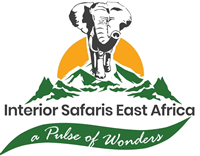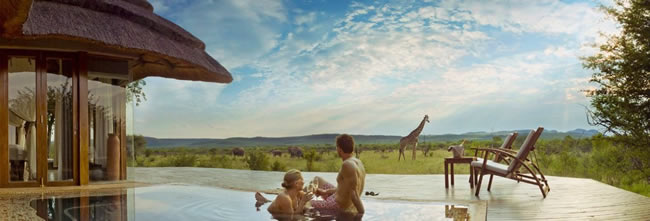
Migration Tour, this program will covers the Tanzania most visited National Parks includes the world hot and famous park Serengeti National Park the main reason for this tour safari itinerary is to allow clients to witness wildebeest migration safari.
Day 1 & 2: Arusha to Lake Manyara
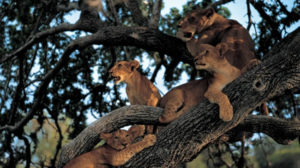 At 08:30 am your driver guide will pick up you from Arusha and transfer to Lake Manyara National Park, We arrive in time for lunch at the lodge and after lunch we head into the Lake Manyara National Park for an afternoon game drive. This national park is one of Tanzania’s most dramatically located wildlife areas, consisting of a massive but shallow soda lake (covering two-thirds of the park), located at the foot of the Great Rift Valley’s western escarpment, The park’s varied habitat attracts a wide variety of animals, including one of Africa’s largest concentrations of elephants, Lake Manyara’s unique tree-climbing lions, as well as large flocks of flamingos attracted by the algae in the lake, After breakfast we head towards the Serengeti National Park, via the beautiful high lying farmland of Karatu and the Ngorongoro Conservation Area, Leaving the highlands behind, we descend into the heart of wild Africa – the Serengeti National Park – with its endless plains, rolling into the distance as far as the eye can see. We head to the central park area, known as the Seronera area, one of the richest wildlife habitats in the park, featuring the Seronera River, which provides a valuable water source to this area and therefore attracts wildlife well representative of most of the Serengeti’s species, We arrive in time for lunch and enjoy an afternoon game drive in the Serengeti National Park, Dinner and overnight in the Seronera area.
At 08:30 am your driver guide will pick up you from Arusha and transfer to Lake Manyara National Park, We arrive in time for lunch at the lodge and after lunch we head into the Lake Manyara National Park for an afternoon game drive. This national park is one of Tanzania’s most dramatically located wildlife areas, consisting of a massive but shallow soda lake (covering two-thirds of the park), located at the foot of the Great Rift Valley’s western escarpment, The park’s varied habitat attracts a wide variety of animals, including one of Africa’s largest concentrations of elephants, Lake Manyara’s unique tree-climbing lions, as well as large flocks of flamingos attracted by the algae in the lake, After breakfast we head towards the Serengeti National Park, via the beautiful high lying farmland of Karatu and the Ngorongoro Conservation Area, Leaving the highlands behind, we descend into the heart of wild Africa – the Serengeti National Park – with its endless plains, rolling into the distance as far as the eye can see. We head to the central park area, known as the Seronera area, one of the richest wildlife habitats in the park, featuring the Seronera River, which provides a valuable water source to this area and therefore attracts wildlife well representative of most of the Serengeti’s species, We arrive in time for lunch and enjoy an afternoon game drive in the Serengeti National Park, Dinner and overnight in the Seronera area.
Day 3: Ngorongoro crater
 We will stopover at Olduvai Gorge, boasting with a history dating back to the dawn of time. It was here, that the anthropologists Drs. Lois and Mary Leakey discovered the skulls of ‘Nutcracker Man’ and ‘Handy Man’, both very significant links in the chain of human evolution, We arrive in time for lunch at the lodge and after lunch we will descend over 600 meters into the crater to view wildlife for a half day’s safari tour. Supported by a year round water supply and fodder, the Ngorongoro National Park supports a vast variety of animals, which include herds of wildebeest, zebra, buffalo, eland, warthog, hippo, and giant African elephants, Another big draw to this picturesque national park is its dense population of predators, which include lions, hyenas, jackals, cheetahs and the ever-elusive leopard, which sometimes requires a trained eye to spot, We will visit Lake Magadi, a large but shallow alkaline lake in the southwestern corner, which is one of the main features of the crater. A large number of flamingos, hippos and other water birds can usually been seen here.
We will stopover at Olduvai Gorge, boasting with a history dating back to the dawn of time. It was here, that the anthropologists Drs. Lois and Mary Leakey discovered the skulls of ‘Nutcracker Man’ and ‘Handy Man’, both very significant links in the chain of human evolution, We arrive in time for lunch at the lodge and after lunch we will descend over 600 meters into the crater to view wildlife for a half day’s safari tour. Supported by a year round water supply and fodder, the Ngorongoro National Park supports a vast variety of animals, which include herds of wildebeest, zebra, buffalo, eland, warthog, hippo, and giant African elephants, Another big draw to this picturesque national park is its dense population of predators, which include lions, hyenas, jackals, cheetahs and the ever-elusive leopard, which sometimes requires a trained eye to spot, We will visit Lake Magadi, a large but shallow alkaline lake in the southwestern corner, which is one of the main features of the crater. A large number of flamingos, hippos and other water birds can usually been seen here.
Day 4: Ngorongoro crater to Arusha
Enjoy breakfast, after which we will transfer back to Arusha. Upon arrival in Arusha will we have lunch and then we will end our safari. The group tipping guideline is around $20 per day, you will be taken to your hotel, which ends our safari services.
End of the tour
Guide price
Price includes:
|
Price does not include:
|
Why do we use guide prices?
The price for every safari depends on the number of people travelling, their ages, the time of year, whether or not international flights are included, the type of transport and accommodation used and the activities undertaken.
We calculate according to the specific dates of your booking because after we publish our itineraries some things may change. For example, hotels may increase their prices, the government may introduce new taxes or some discounts may become available. Unfortunately, we also have to pass on surcharges imposed on us by, for example, airlines when fuel prices or airport taxes are unexpectedly increased.
We would be happy to prepare a quotation, based on your requirements. We normally include most costs in the price so all you need to bring with you is ‘pocket money’ for items like drinks, tips and personal shopping e.g. souvenirs.
Insurance
AMREF flying doctors provide a medevac service in case of illness or injury during your safari. This costs $25pp for 31 days. We recommend this service and can include it in your package price.
Booking
Once you have selected one of our safari packages you need to send us a booking form. When we receive this we will check availability and inform you if any changes are necessary and issue an invoice for a 50% deposit plus the full cost of any tracking permits (in case of cancellation permit fees are non-refundable). Only once this payment is received can we guarantee availability and issue a booking confirmation. Full payment is required 70 days before travel.
Payments and cancellation
We charge in US dollars. Payment is by bank transfer into our Standard Chartered USD bank account in Uganda. You can also pay by credit card although there is a 5% administration charge. For those booking from within Uganda, cash payments are possible at our office.
When we book your safari, we have to pay non-refundable deposits on your behalf, for example to hotels. Therefore, we charge cancellation fees as follows:
30% of reservation costs if you cancel more than 50 days before your arrival date
100% of reservation costs if you cancel less than 50 days before your arrival date
We strongly recommend that you include cancellation cover in your travel insurance.
Disclaimer: We enter into an agreement with you in good faith but we sometimes encounter unexpected changes in local conditions which can affect your itinerary or price. These changes are beyond our control and we are not liable for them. While we endeavour to protect you against the effects of these changes, we reserve the right to amend the agreed itinerary and price in response to them. Such changes include but are not limited to weather conditions, road conditions, supplier price increases, fuel increases, government tax increases, supplier service changes e.g. cancellation of ferry services for river crossings or national park operations (track maintenance, animal translocations). We assure you that, we will always give you as much notice as possible of changes, suggest alternative plans and keep additional charges to a minimum.
Accommodation
To help us select the right accommodation for your safari (and in the absence of a complete national hotel classification system e.g. 1*–5*) we use four levels: high-end, mid-range, budget and backpackers. These terms can mean different things to different people but are helpful to an extent.
Air-conditioned rooms are not available in all hotels. Where AC is available, there is usually an extra charge.
Some locations have a limited choice of accommodation and so, to stay there, you must accept what is available. Where possible we prefer to work with responsible accommodation providers. This means hotels and lodges which are locally owned, employ local staff, support their community and protect the local environment.
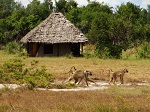
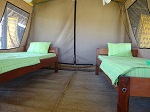
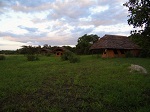
Transport
As standard, we use a spacious 7-seater, 4×4 safari Land Cruiser, with pop-up roof, fridge and phone/camera charging facilities. This is the perfect safari vehicle.
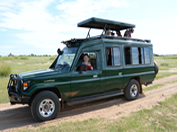
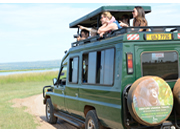
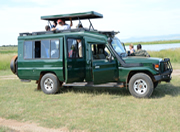
Alternatively, we offer a slightly cheaper 7-seater, 4×4 safari van with a pop-up roof.
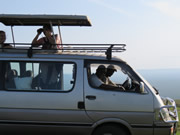
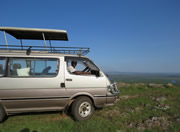
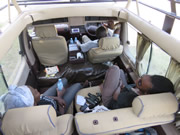
5-seater versions of both Land Cruisers and vans are also available.
For large group tours we use small buses called Coasters. These usually seat around 28 people, including 5 jump (fold-down) seats in the aisle. They do not have a boot/trunk so luggage is carried on the back seats which reduces the seating capacity. The overhead luggage shelves are small and can only accommodate small bags. Therefore, we recommend you do not over pack.
All vehicles include a driver/guide and fuel for your itinerary. Additional activities, not included in your itinerary, may incur an additional fuel charge. Our vehicles are comprehensively insured, in good mechanical condition and have seat belts fitted.
Please let us know if you have any special travel requirements. For example, if your group has disabled members we will do our best to accommodate your needs.
